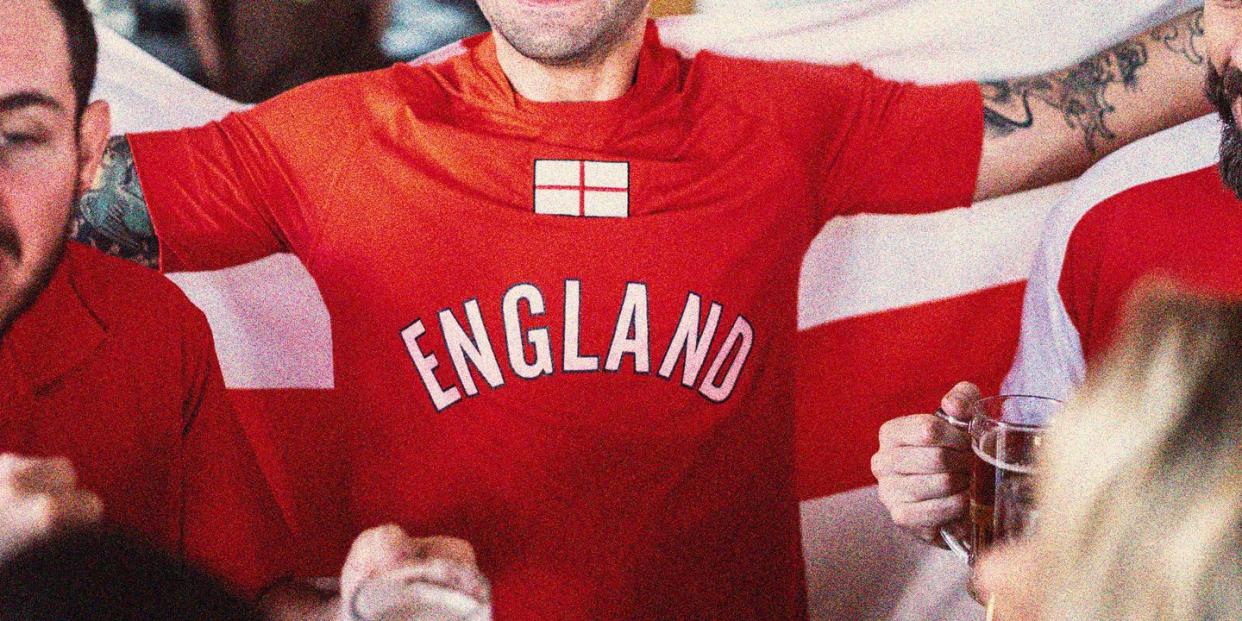Football doesn't cause abuse – but cases do rise when England lose a game

Given we're now in the thick of the Euros, with England set to play Switzerland this Saturday in the quarter-finals, it's an important time to highlight how, heartbreakingly, the link between football and domestic abuse still very much exists – which is why Women's Aid and House 337 have partnered on a new campaign, No More Years of Hurt.
The project seeks to highlight how violence against women is at an all-time high while funding for women's services is at an all-time low, and how past research by Lancaster University found a 38% rise in domestic abuse when England lose a match (and a 26% increase when they win or lose).
To be clear: football or consuming alcohol while watching a match does not cause violence. Only abusers cause abuse. But the link suggesting existing domestic abuse can become more frequent or severe during big games is still deeply worrying.
Speaking about the latest instalment of its award-winning He's Coming Home campaign (which has run for a decade now), Women's Aid detailed that it has produced a series of football scarves containing important messaging and has launched a fundraiser (which you can donate to here).
"The campaign features specially created classic football scarves imprinted with well-known football chants that have been subverted to highlight the domestic abuse emergency," the organisation explains. "The scarves are emblazoned with slogans [and] interwoven with some common misogynistic terms and sayings that perpetuate domestic abuse. The words are not immediately noticeable but become clearer and more recognisable the longer you look, reflecting how domestic abuse in our society is hiding in plain sight."
Speaking further about the new push to highlight awareness concerning domestic abuse during football season, Teresa Parker, Head of Media Brand & Relationships at Women’s Aid, said: "The most well-known statistic about football and domestic abuse is the study by Lancaster University showing that reports of domestic abuse can rise by up to 38% after big international football games, and this research relates to the World Cup in 2002, 2006 and 2010.
"While more research is needed, from speaking to women running local domestic abuse services in our national network, we know there is a very real impact – from being told how the television is turned off during the Euros because it brings back too many memories for those living in refuges, to survivors having nightmares during international tournaments."
Parker also added that one of Women's Aid's member organisations, The Dash Charity, reported a worrying 79% rise in helpline calls and referrals at the time of the last Euros in 2021. "Calls to The Dash Charity are expected to spike during UEFA Euros 2024 and I Choose Freedom have told us they have seen a rise in referrals during the tournament this year, compared to before the Euros started," she noted.
On the flip side, says Parker, football can also play a very positive role in raising awareness, and challenging sexist and misogynist attitudes that underpin violence against women. "We are really proud to work with football organisations and clubs like Fulham FC in doing this, and to run awareness raising campaigns such as 'He's Coming Home' and our Euros campaign 'No More Years of Hurt' to use big footballing moments for good, as we know awareness literally can help save lives."
To get help for yourself or to learn how best to support someone else, Women's Aid can be reached by email, live chat (between 8am - 6pm on weekdays and 10am - 6pm on weekends) and runs a supportive online forum for survivors to chat and get advice. In an emergency, always call 999.
For help over the phone, there are plenty of other supportive organisations out there too:
National Domestic Abuse Helpline – 0808 2000 247 (run by Refuge)
The Men’s Advice Line, for male domestic abuse survivors – 0808 801 0327 (run by Respect)
The Mix, free information and support for under 25s in the UK – 0808 808 4994
National LGBT+ Domestic Abuse Helpline – 0800 999 5428 (run by Galop)
Samaritans (24/7 service) – 116 123
Rights of Women advice lines, there are a range of services available
You Might Also Like

 Yahoo News
Yahoo News 
